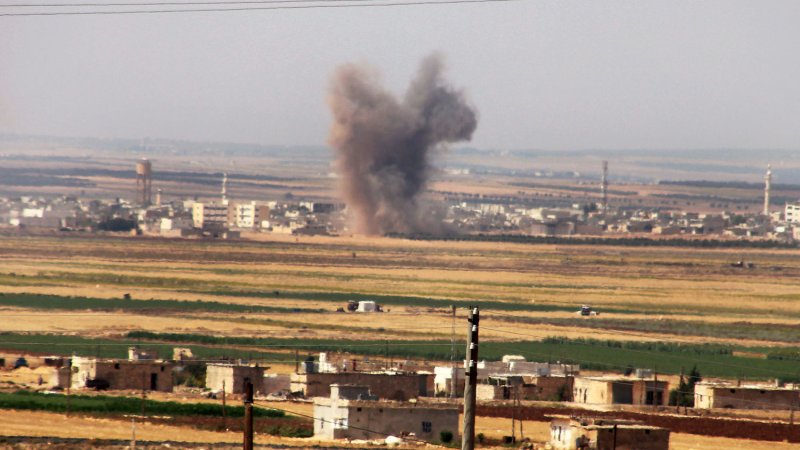Black smoke rises over Aleppo, Syria, after government airstrikes on September 12, 2012. Syrian rebels have vowed to retake control of the large Hanano army base in Aleppo, a few days after loosing control of it to Syrian government forces. UPI/Ahmad Deeb |
License Photo
BEIRUT, Lebanon, Sept. 26 (UPI) -- The double bombing of the Syrian army's general staff headquarters in a heavily guarded quarter of Damascus Wednesday severely jolted the embattled regime of President Bashar Assad and points to the rebels' growing military capabilities.
The bombs were apparently planted in the command building in Umayyad Square in central Damascus and were supposedly intended to kill senior officers.
The regime, which usually seeks to minimize the impact of such attacks, announced there were no fatalities.
The rebel Free Syrian Army, which has often exaggerated its claims, said dozens of people, including the military's chief of staff, Gen. Ali Abdullah Dayyoub, were killed in the 7 a.m. blasts.
Whether there were any fatalities is irrelevant as the rebels increasingly hold their ground to slug it out with Assad's minority Alawite regime in a civil war that began with an uprising March 15, 2011.
The fact that the FSA, which announced Saturday it had moved its headquarters from neighboring Turkey to northern Syria, was able to penetrate the regime's security to hit a key target and symbol of the Assad dynasty underlined the rebels' growing reach.
They have repeatedly targeted Syrian security headquarters buildings in the last few months as their military capabilities improved, strikes that seem to be sapping the confidence of a regime some say is weakening.
If it turns out that senior officers were killed Wednesday, it will be the most important rebel strike since July 18, when a bomb planted in the supposedly secure National Security Headquarters in Damascus killed key members of Assad's inner circle. They included his brother-in-law, Maj. Gen. Asaf Shawkat, as well as the defense minister, his deputy and the interior minister.
Attacks like Wednesday's twin bombings are usually carried out between 9 a.m. and 10 a.m. when the number of important officers in the target buildings is often at its highest.
On Tuesday, the FSA reported seven bombs exploded in the Sons of Martyrs School in southwestern Damascus that it said was being used as a security headquarters. The bombings, which occurred at 9.35 a.m., were timed to coincide with a weekly political indoctrination meeting attended by leaders of the Alawite militia known as the Shabiha.
"But even without significant casualties, the attack will place additional stress on regime forces," observed the U.S. global intelligence consultancy Stratfor.
"The regime is already facing a war of attrition, is struggling to find recruits and is dealing with declining morale.
"Rebels are targeting the highest levels of the security and intelligence apparatus in a bid to strike a decisive blow to break the current stalemate," Stratfor concluded.
"Fears of internal sabotage or betrayal will be on the rise."
Damascus, which many say is the oldest continuously inhabited city in the world, has become a battleground in recent weeks.
Rebels hold several parts of the city of 2 million people. These are under constant artillery, rocket and air bombardment by regime forces.
The use of Soviet-era MiG and Sukhoi fighter-bombers and helicopter gunships against rebel strong points in the capital appear to underline the regime's growing desperation.
"Southern Damascus has, in recent months, become a battlefield ... turning what was thought to be Assad's untouchable seat of power into disputed territory," al-Jazeera reported Tuesday.
The army's notorious 4th mechanized Division, commanded by Assad's headstrong younger brother Maher, is heavily engaged in the Damascus fighting.
Like the elite Republican Guard, also headed by Maher Assad, and air force intelligence, which has nothing to do with military aviation and is in fact the regime's top dirty tricks apparatus, the 4th is made up of diehard Alawite loyalists.
The battles in the capital began in July when the FSA launched an offensive called Damascus Volcano.
The outnumbered and outgunned rebels took several districts. They were forced to relinquish some in heavy fighting, but they still hold others.
They've also seized parts of Aleppo, a northern city and Syria's commercial capital as more and more Syrians, mostly majority Sunnis and even Christians who've long sat on the fence, rally to the rebel cause.
"The most important factor is the deepening and widening of the uprising over recent months," observed Middle East analyst Shashank Joshi of London's Royal United Services Institute.





